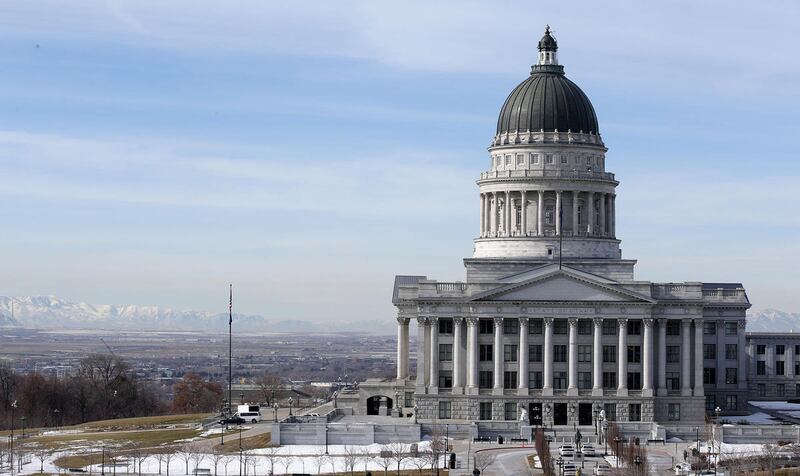SALT LAKE CITY — Utah legislators are again trying to find a new way to select members of the Utah State Board of Education after a handful of bills attempting to do so failed last year.
Members of the Senate Education Committee voted Friday to advance a bill that would only change portions of the current statute for selecting State School Board members that were ruled unconstitutional by a federal judge in 2014.
But the favorable 4-1 vote came with some reluctance from committee members, who saw SB78 as a "stopgap" and a measure that "keeps a solution alive" for State School Board elections.
"We have to do something. Something has to go forward," said Sen. Stephen Urquhart, R-St. George. "If not this bill, we have the abyss."
The system Utah has used to fill seats on the State School Board had a nominating committee that would screen all candidates, then recommend some of them to the governor, who would make a final selection of names to be put on the ballot.
That method was eventually struck down by U.S. District Judge Clark Waddoups, who ruled it gave the review committee "unfettered discretion" in the selection process, and that portions of the statute violated candidates' free speech rights.
In November, Gov. Gary Herbert announced he would not organize a nominating committee for the 2016 election, leaving the pathway to being elected to the State School Board open to anyone who files as a candidate.
SB78, sponsored by Senate Education Committee Chairwoman Ann Millner, R-Ogden, takes a different approach to fixing the problem. Instead of giving the governor authority to make a final selection of board members, or vetting them through a partisan or nonpartisan election, Millner's bill would maintain the historic roles of the review committee and the governor.
But the bill prohibits them from considering candidates "based on the (candidate's) political or educational philosophies, viewpoints or affiliations."
Millner said that would address unconstitutional portions of the current statute, which Waddoups ruled as creating "an unacceptable risk of the suppression of ideas." The bill would also be repealed after this year's elections, giving legislators more time to find a more suitable permanent solution, she said.
"We need to be able to select our candidates in 2016 who will vie for the seats on the State Board of Education that are open at this time. And we need a process that we believe will address the judge's concerns. That's what this bill does," Millner said. "Let's try to just address the specific concerns that the judge pointed out in his decision and use that to get us through 2016."
Several lawmakers and other groups opposed the idea of removing "educational philosophies" as a component of a candidate's selection and basing a decision of selection solely on experience.
Tami Pyfer, education adviser to the governor, said Herbert's office opposes the bill, though it's not yet clear if it would be vetoed should it pass the Legislature.
"We just believe that that's not good policy when you're making an appointment as important as the State Board of Education but not being able to ask or consider a person's educational philosophies," she said.
Pyfer said the governor has proposed establishing a primary election in June as another alternative to winnow down the pool of candidates, but a bill for that measure hasn't been filed.
Sen. Jim Dabakis, D-Salt Lake City, echoed similar concerns that avoiding educational ideologies during the process would be impractical.
"This puts the nominating committee, and I presume the governor, in either the position of lying or of somehow tiptoeing around … what their educational viewpoints are," Dabakis said. "I understand that the judge is requiring this, but it doesn't make any sense to me."
Other lawmakers see it as an acceptable temporary solution, with the likelihood of restructuring the election system later on.
"This is the first step in the process of addressing Judge Waddoups' decision," said Sen. Howard Stephenson, R-Draper. "This is a brilliant solution to make sure that we don't wind up on the November ballot with somebody who's elected to the State School Board with only 18 percent of the vote. I think that would be a travesty."
Millner's bill could be the only active initiative so far by the Legislature to address the problem. After the 2015 legislative session, Sen. Alvin Jackson, R-Highland, proposed a "compromise" bill that would combine attempts to make State School Board elections partisan, nonpartisan or appointed by the governor.
But Jackson said he doesn't expect to introduce the bill this session for "at least two to three weeks," he said.
"I'm not even sure we can make it out of committee," Jackson said, citing last year's failed attempts to reach a compromise. "If we can't have partisan, if we can't do it nonpartisan and we had to do something, it's an option."
SB78 now awaits approval by the full Senate.
Email: mjacobsen@deseretnews.com
Twitter: MorganEJacobsen


